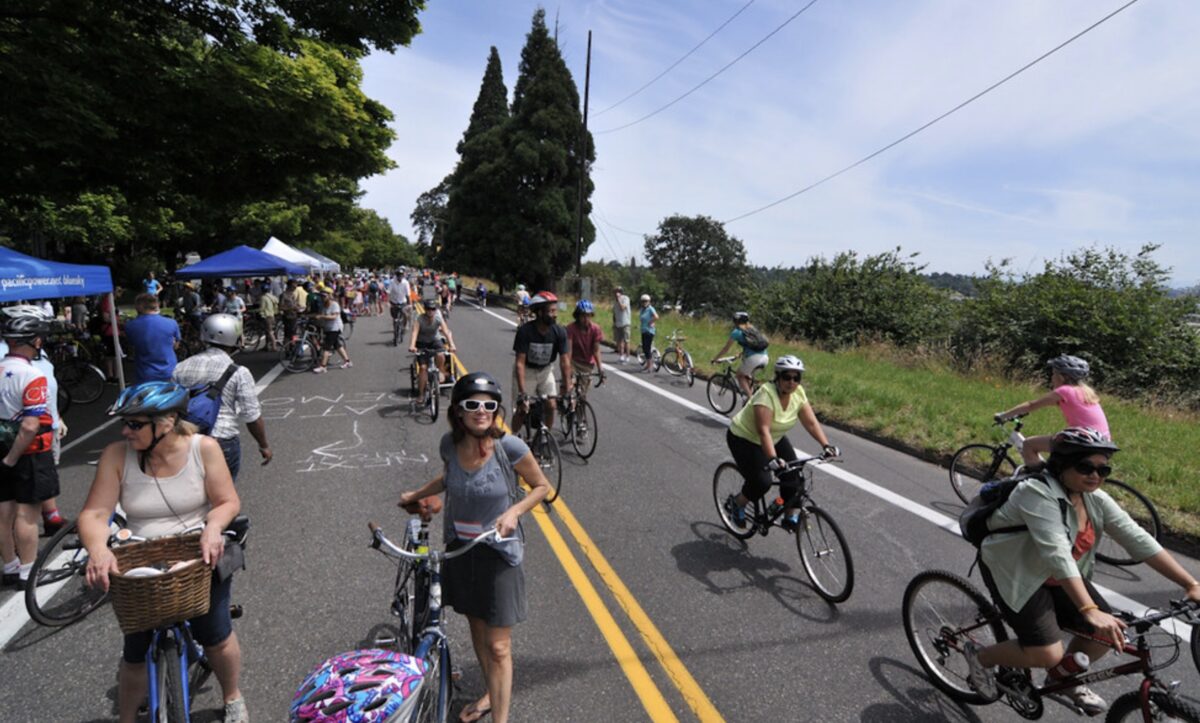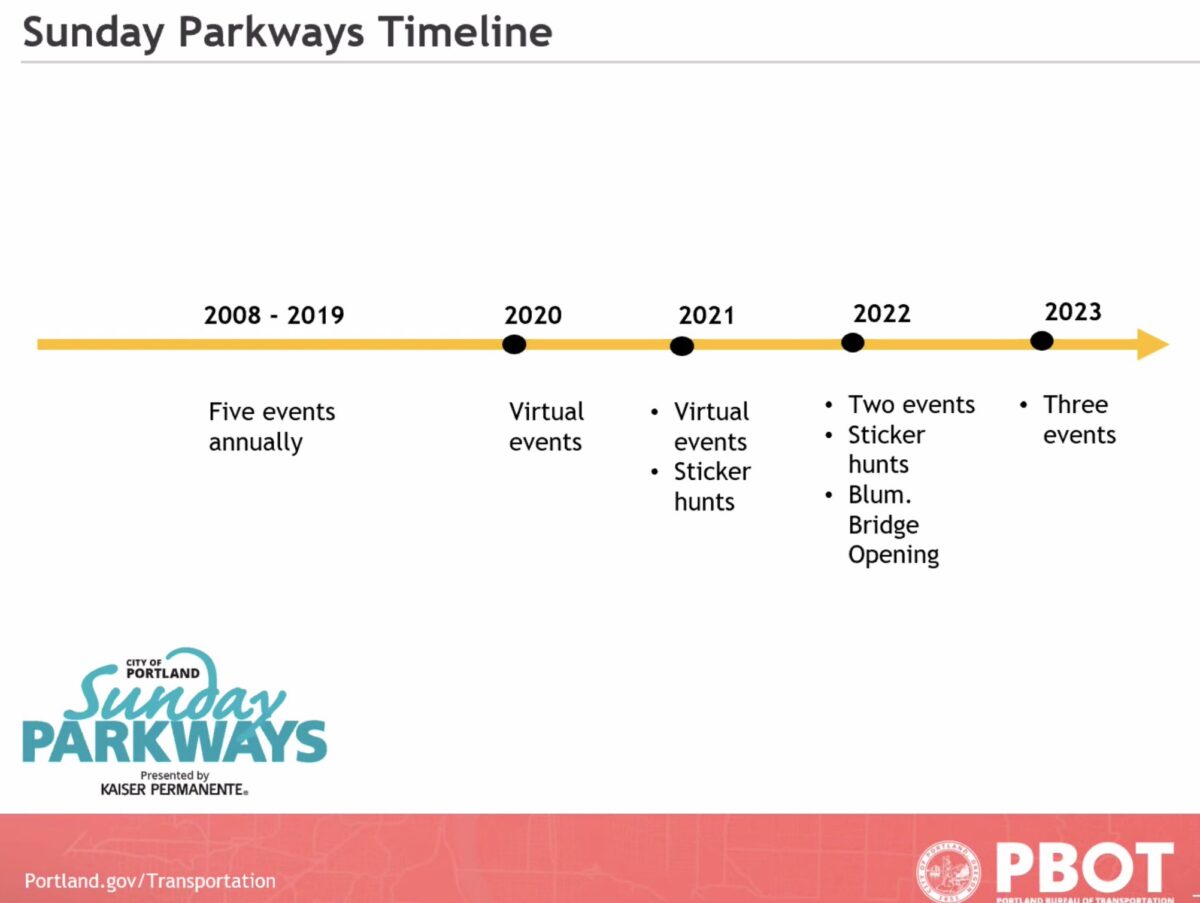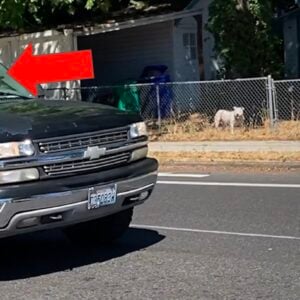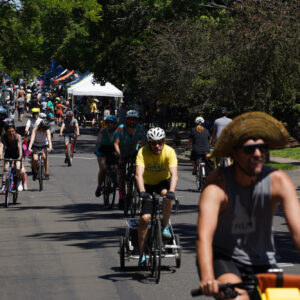The Portland Bureau of Transportation has new plans for Sunday Parkways – and they may be disappointing to fans of the annual open streets event. This summer marked Sunday Parkways’ return for the first time since the pandemic began, but instead of the usual five in-person events held throughout the summer, there were only two this year.
At this month’s Portland Bicycle Advisory Committee meeting, PBOT Programs Manager Renata Tirta announced there will only be three events in 2023.
Other than hesitancy about Covid transmission, one of the concerns Tirta shared whether or not they would have enough staff and volunteers to keep things running smoothly. And after the road rage incident at the final Sunday Parkways event last weekend, PBOT may face further challenges recruiting volunteers for big open streets events in the future.
In a follow-up conversation after the meeting, PBOT Public Information Officer Dylan Rivera told us the bureau wants to move toward different programming and allocate limited funds differently, which will mean fewer Sunday Parkways events and more smaller open streets festivities happening across the city.
Despite its huge success and total lack of opposition or controversy, budget issues have long plagued Sunday Parkways. Just one year after its debut, PBOT had to crowdfund to help cover costs. Then in 2010 the City Budget Office declined PBOT’s request for help paying almost half of the program’s $500,000 (five event) budget. They felt other “basic services” were more important. In 2012 former Commissioner Dan Salzman also didn’t see the value in funding Sunday Parkways over “other transportation priorities.”
And most recently, in PBOT’s FY 2021-2022 budget, the Parkways program funding (which is one of five programs in the Active Transportation & Safety Division along with Vision Zero, Safe Routes to School, Transportation Demand Management and the E-Scooter Pilot that has a total budget of just over $7 million) was cut again. PBOT had three events planned for 2022, but the budget allowed only for two.
Going forward, PBOT seems to be planning for an even more budget-constrained reality and will double-down on what they see as a more local approach to this event.
Instead of rotating routes annually, they plan to hold three events with different routes around the city and repeat them for three years in a row so people can get comfortable with the layout. This may mean people who live in parts of Portland far from the Sunday Parkways routes will decide to opt out three years in a row, but Rivera said the benefits are meant for the people who live in the communities they’ll target.
“Repetition is helpful for familiarity,” Rivera told BikePortland. “It helps neighborhoods become familiar with experiencing Sunday Parkways.”
Specifics about next year’s events — or the events PBOT is planning to fill the Sunday Parkways void — aren’t yet available. But Rivera said they’ll focus the locations on parts of Portland that have been traditionally underserved by active transportation planning, especially as the city’s bike network expands into these areas and PBOT wants to show off new projects.
“We will continue to inspire the public in those areas to embrace that infrastructure as a way to incorporate biking and walking into their everyday lives,” Rivera said.
These changes beg the question: what should Sunday Parkways do for Portland? PBOT wants the events to serve a larger purpose in our city’s transportation system and culture by encouraging people to get out into their neighborhoods and try different modes of transportation in a comfortable, carfree setting. But if they’re starved for funding, it will be hard to move the needle in that regard (a similar situation to our bike share system that has lofty goals but a lack of funding and bikes severely limits its potential).
Five Sundays a year is already a far cry from the weekly carfree “ciclovia” events in Bogotá, Colombia that inspired Portland’s first Parkways in 2008. Reducing it to three days a year widens that gap and is a step in the opposite direction from what many Portlanders dream of. “Bummer to see this program get smaller in scope instead of more ambitious over the years,” said one former Bike Advisory Committee member when we shared this news on Twitter a few weeks ago.
If PBOT doesn’t find more sponsors or city funding, maybe Portlanders will find a more DIY approach. Perhaps these changes will inspire even more community-organized events in the style of big Pedalpalooza rides or the ‘Sundays on Going’ events Bike Loud PDX has organized all summer.
Whatever happens, the future of Sunday Parkways after 14 years isn’t quite what we hoped for. On the bright side, it’s still alive and kicking (at least for now).
Portions of this story written by Jonathan Maus.









Thanks for reading.
BikePortland has served this community with independent community journalism since 2005. We rely on subscriptions from readers like you to survive. Your financial support is vital in keeping this valuable resource alive and well.
Please subscribe today to strengthen and expand our work.
The $500,000 budget is for 5 events. So, does that mean 1 Parkways event costs $100,000? How does it even cost anything? It’s almost completely run by volunteers and it’s just some barricades put up while people bike around.
I’m not sure exactly what one event costs these days. I should find out and report it out though. I know that a few years ago PBOT reduced the cost of each one dramatically when they took police out of the picture. Last I heard they cost about $85,000 a piece.
Yeah, according to this article https://bikeportland.org/2012/01/11/commissioner-saltzman-questions-city-spending-on-sunday-parkways-65058 it looks like costs have gone down. It also says the money goes to Good Sport Promotion to manage volunteers.
It would be interesting to see a cost breakdown comparison between Sunday Parkways and Sundays on Going and see what the differences are. It looks like NYC spends around 7 million for its Open Streets program (https://www.nytimes.com/2022/08/11/nyregion/open-streets-nyc.html). They fund a lot of activities during the events, but still I feel like maybe there’s another way for cities to go about providing these types of events that doesn’t require massive amounts of money. It doesn’t make sense to me the cities are paying hundreds of thousands of dollars just to block off it’s own streets to cars for a day or two.
There is a sea change this year. Times change. A new world, why do we keep this event?
Care to explain what you’re referring to?
I don’t see why it costs so much for someone to manage a bunch of people they don’t pay, or why the management itself couldn’t be performed by volunteers?
I believe that they also have paid staff, plus rent out sound equipment, extra bike parking and more.
They do a lot of outreach to folks who live along the route, mailings and stuff along with advertising the event generally probably eats up some of that money. We got at least one, maybe two notices because we live along the route trying to help people figure out how to still get where they need to go without endangering people.
So one entitled jerk brings a gun and makes a stink and that’s enough to get the events reduced.
Where can I sign up to voluenteer for next year?
https://www.portland.gov/sunday-parkways/volunteer
It seems counterintuitive for the city to limit the number of Parkways which motivate people to get on their bikes and explore new infrastructure and routes that may lead them to ditch their cars for local trips or commuting.
Portland is the USA’s most sustainable city.The 15 Most Sustainable Cities In The US | Rocket Homes
Another step back for our fair city.
It’s only counterintuitive if you assume PBOT cares about cycling. Hardesty has made it clear they don’t.
Thank you for that link. It’s nice to read some good news again.
Well that’s just how it is is.
Downtown dies, who cares.
Sunday parkways is just like blockbuster.
I agree there’s some benefit to repetition in the same location, but I think it’d be more useful if the events had any sort of real frequency. If it were once a week or even once a month in the same location, I’d be more inclined to agree.
But once a year is a special event, like a parade. You might get people to show up for it reliably on an annual basis, but I’m not sure how much of a change that makes in people’s ongoing relationship to the streets for the other 364 days. (It could even reinforce that people-oriented streets are a deviation from the norm rather than an everyday thing.) Even if one day a year 100% of Portlanders biked, that’s not anywhere close to the 25% mode share we need for the year.
I know these events are popular, but I’ve always wondered how much they encourage cycling or active transportation in general — or if they might even undermine normalization of these things.
The implicit message in presenting them as safe for beginners is that alternatives are unsafe. There are areas all over town that are great for learning safely and for gradually expanding one’s experience and comfort in different conditions.
These large events encourage thinking of cycling as extranormal rather than normal — the practical effect being that would be cyclists truly believe they only belong in specially designated areas unless there’s some kind of special event. This prevents them to ever feel comfortable operating independently wherever they need to be, something that seems to be a serious issue even for people who’ve been riding for years here.
500 G’s is a lot of dough, and despite the mantra here that “paint is not protection,” it makes a massive difference. The difference on the new area of Lombard is night and day from what it was. When Interstate got striped nicely it was a total game changer as was the nice wide lanes that got added to Denver not so long ago. Those types of differences open areas to totally new groups of riders. Looking for ways to make more areas available to more people as a “normal” thing seems like a better way to encourage cycling than periodic spectacles.
100% agree. Sometimes I wonder if the loudest activists even ride bikes themselves. It’s one thing to feel morally superior in an argument online… but day-to-day experience on two wheels is vastly different.
If they don’t think paint matters, they should try riding the fog line on a rural highway with no shoulder. I just did 150 solo miles of that last weekend… and it would no doubt be an an eye-opening experience for someone who takes our city’s facilities for granted. In a few ways…
First, you really learn to appreciate that tiny little 3′ “unprotected” bike lane back in Portland. That’s Cadillac-level infrastructure compared to so much of the world.
Second, you learn that the vast majority of drivers are courteous, despite what Bike Loud and others want you to believe. They’re people, like all of us, and most just want to pass safely and get on with their days. Hell, quite a few of them are probably cyclists themselves.
When you’re out there on your own, the ego is laid bare. There are no cycletracks or Neighborhood Greenways or “crossbikes” to bicker over. Nobody egging you on to pick a side in some unnecessarily divisive and petty political squabble.
It’s kind of nice.
Hi,
I will loudly say “paint is not protection” and I will loudly say that “paint makes a huge difference”. This isn’t a binary argument.
Agree. We need more protected infrastructure on key routes where it will do the most good, we need to fill gaps and reduce high stress conflict points on those routes to make them more useful for novices and safer for all, AND we need more paint only bike lanes on urban and rural arterials where densities and use patterns don’t necessitate physically separated infrastructure. We need all of it.
I’ve been hit by a car at highway speed while riding along hwy 99. 7 broken bones, my knee torn nearly in two and my leg almost severed. Paint is not Protection.
Well they can’t even keep armed motorists out of them now. What’s the point of these if you have no security to keep the streets closed and motorists can flash guns at grandmas volunteering without any repercussions
Yeah, totally, we should also like cancel congress because they couldn’t keep out armed Trumpers on J6.
I wish there was a way to incentivize individuals to just get out and ride. We could interact as our paths converge, making a bold presence on our public streets. The increased bike traffic would have a calming affect on automobile traffic making it safe
I couldn’t agree more that increased bike traffic would have a calming effect — with the added benefit of raised awareness further increasing safety. The more of us that ride, the more rideable these areas become.
Little perks aimed at individuals that perpetuate cycling as an “extra” thing won’t help and help cement the status of cyclists as some weird outside group.
Rather, showing people that it’s a more fun, cheaper, healthier, faster (often if not usually), and all around better way to get around simply by being out there strikes me a better incentive. I’d totally lose any characterization of riding as any kind of battle as that is only a strong incentive not to ride.
Sunday Parkways seems not be aware that SW Portland pays taxes and is a part of Portland. As a resident of SW Portland, as far as I’m concerned the event doesn’t exist and us SWers shouldn’t have to subsidize it.
SW also has lots of low-traffic streets, the miles-long riverfront Willamette Greenway Trail that’s clean and safe, huge parks, etc. And those are available year round, not just on special event days as are the Sunday Parkways.
If that’s your criteria then why do we need it on the east side at all? Bike infrastructure is all over the place in North and east Portland. The west side is significantly underdeveloped in comparison.
The Sunday Parkways seem aimed (to me, I may be wrong) at giving people, especially those with kids, and people who may not bike regularly, opportunities for safe recreational riding. Even if it’s true that the West side is “significantly underdeveloped” with bike infrastructure compared to North and East Portland (I don’t think it is) a lot of the infrastructure in N and E Portland doesn’t seem to be the type that is conducive to group recreational riding, especially with kids, and with people who aren’t regular riders. The west side seems to have lots of places where people can ride safely recreationally, even if some of it (low-traffic streets and parks) isn’t considered “bike infrastructure”.
And if you look beyond biking to other recreational opportunities/facilities (parks, trails, etc.) N and especially E Portland don’t even come close to SW.
So your we-shouldn’t-have-to-subsidize-it-with-our-taxes stance seems extreme.
It’s disappointing that there were no Sunday Parkways events closer-in this year. Expanding the events to Cully and East Portland makes a lot of sense, but canceling all the events in the central neighborhoods of the city is a huge loss. I hope the city reconsiders for 2023.
This is a stepback, obviously. It would make sense, since downtown is “dead” these days, to have a weekly open streets event there where downtown is closed to cars. As all of our societal crises seem to be escalating, bold action is what is needed.
I hope that the city will take more time to find the right places for these routes, or rethink what Parkways can provide to the PDX community at large. It is complex because if you are trying to reach underserved communities, you will encounter more difficulties with residents along the route and non-participants. Underserved communities are often under more stress and as a result, can be less accepting of inconvenience or change. I think that rather than pushing these routes to the edges of Portland Metro, a literal middle ground can be established to draw the most residents and bring communities together. North portland was the perfect route set-up because it was flat (easy for all), reached all types of communities (large), many parks, and drew people from far away, I know this because I participated/ volunteered every year and chatted with people who attended from even outside of PDX! We have the bridge pedal, and that’s fine, but in my mind, one large festival celebrates the city, and its mobility + reaches as many residents as possible. Also if you have it on one big day you can cut costs significantly.
I’m glad to see PBOT experiment with different approaches and I’m looking forwarding to “smaller open streets festivities happening across the city,” which seem like they could benefit more neighborhoods.